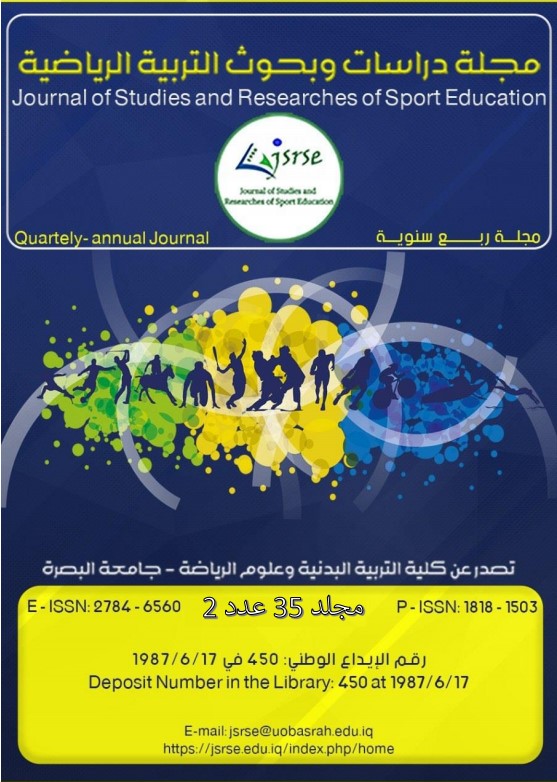The impact of the model of visual motor task learning supported by VAR technology V.A.M.T.L.M on the motor learning outcomes of some basic boxing movements among students
Main Article Content
Abstract
The study aimed to identify the impact of the model of visual motor task learning supported by VAR technology V.A.M.T.L.M on the motor learning outcomes of some basic boxing movements for students. The study used the experimental method with a non-equivalent groups design with pre- and post-tests. The study used two tests to evaluate the performance of the straight punch and hook punch in boxing. The procedures of the V.A.M.T.L.M learning model were applied in two stages: preparatory and implementation. The study concluded that the V.A.M.T.L.M model of visual motor task learning supported by VAR technology has a positive impact on the motor learning outcomes of some basic boxing movements for students compared to the traditional teaching method of command and teacher guidance.
Article Details

This work is licensed under a Creative Commons Attribution-NonCommercial 4.0 International License.
References
Abdelkader, A. K. (2023). The Effect of Karen’s Model on Teaching Some Grips in Wrestling for Students. Journal of Studies and Researches of Sport Education, 33(1), 323–336. https://doi.org/10.55998/jsrse.v33i1.382
Abdul Wahid, M. E. A. W., & Al-Taie, M. M. H. M. (2022). The effect of role-playing strategy using mobile phone in learning the skills of scoring and stopping in football. Anbar University Journal of Physical Sciences and Sports, 13(25), 171–190. https://doi.org/10.37655/uaspesj.2022.179509
Ahmed, M. A. at al. (1990). Boxing Education and Training. Ministry of Higher Education and Scientific Research.
Al-Marjani, A. K. (1998). A study of some basic determinants as an indicator for selecting juniors for boxing [PhD thesis]. University of Baghdad.
Al-Taie, M. M. H., Mohammed, O. Q., & Al-Azzi, M. H. M. (2024). The effect of the comparative feedback method using video technology in teaching the front handspring movement on the vault table in artistic gymnastics for men. Anbar University Journal of Physical Sciences and Sports, 15(29), 1–10. https://doi.org/10.37655/uaspesj.2024.146360.1108
Belkhair, H., & Makhlouf, M. (2023). The relationship between mental imagery and motor learning in athletes and its role in sports competitions. Journal of the Sports System, University of Djelfa, Algeria, 10(1).
Hassan, M. M., Khalaf, H. H., & Mosleh, O. A. (2023). Impact of Instant Visual Guidance via Video Technology on the Correction of Some Offensive Skills Performance Errors in Basketball. Asian Journal of Sports Medicine, 14(4). https://doi.org/10.5812/asjsm-135841
Hassan, M. M., & Musharef, A. J. (2024). The effect of the mental training method accompanied by standard feedback in learning the technical performance of the forward roll diving movement in artistic gymnastics for men. Journal of Studies and Researches of Sport Education, 34(1). 10.55998/jsrse.v34i1.473
Jassim, H. A. K. (2015). The effect of motor coordination exercises using fixed and variable methods according to sensory preference in learning the side and upward punch in boxing for students [Master’s thesis]. University of Karbala.
Kok, M., Komen, A., van Capelleveen, L., & van der Kamp, J. (2020). The effects of self-controlled video feedback on motor learning and self-efficacy in a Physical Education setting: an exploratory study on the shot-put. Physical Education and Sport Pedagogy, 25(1), 49–66. https://doi.org/10.1080/17408989.2019.1688773
Mahjoub, W. (2002). Theories of Learning and Motor Development. Wael Printing and Publishing House.
Nunes, M. E. de S., Correa, U. C., de Souza, M. G. T. X., & Santos, S. (2021). Descriptive versus prescriptive feedback in the learning of golf putting by older persons. International Journal of Sport and Exercise Psychology, 19(4), 709–721. https://doi.org/10.1080/1612197X.2020.1717579
Sigrist, R., Rauter, G., Riener, R., & Wolf, P. (2013). Augmented visual, auditory, haptic, and multimodal feedback in motor learning: A review. Psychonomic Bulletin & Review, 20(1), 21–53. https://doi.org/10.3758/s13423-012-0333-8
Wajih, M. (2000). Theories of learning and motor development (p. 175). Ministry of Education Press.





 IASJ
IASJ CC-BY-4.0
CC-BY-4.0 turnitin
turnitin ISSN
ISSN DOAJ
DOAJ Crossref
Crossref GoogleScholar
GoogleScholar Orcid
Orcid